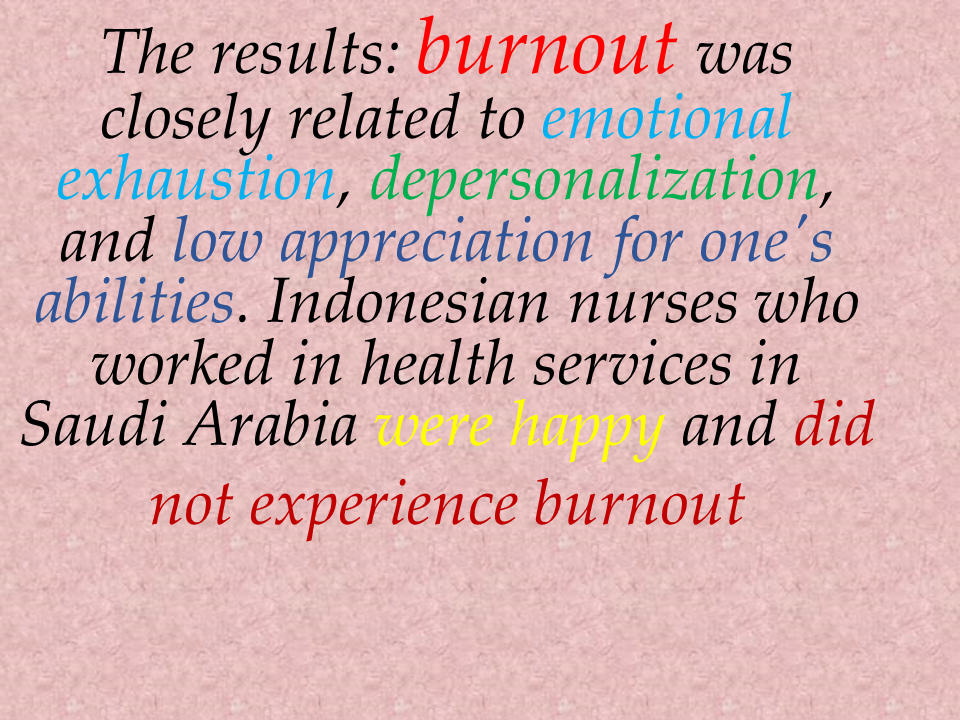Analysis of Burnout and Job Satisfaction with Intention to Leave among Indonesian Nurses in post Pandemic in Saudi Arabia
DOI:
https://doi.org/10.23917/bik.v17i1.3877Abstract
The Covid pandemic has ended but health workers, especially nurses in Saudi Arabia, are still experiencing burnout due to high workloads. This study aims to analyze burnout and job satisfaction related to intention to leave among Indonesian nurses in health services in Saudi Arabia. This research used a qualitative method with a case-study approach. The research subjects used purposive sampling with a typical case of 12 Indonesian nurses who worked in health services and terminated their work contracts in Saudi Arabia. This research used data triangulation, source triangulation, and peer debriefing. In-depth interviews conducted at a predetermined place, data analysis follows 7 steps of Colaizzi's analysis. The results showed that burnout was closely related to emotional exhaustion, depersonalization, and low appreciation for one's abilities. Indonesian nurses who worked in health services in Saudi Arabia were happy and did not experience burnout. Meanwhile, job satisfaction or nurse satisfaction in dealing with work situations and environments is related to internal factors such as salary and rights to work facilities, while externally, it is related to self-development and professionalism.
Downloads
References
Akinwale, O. E., & George, O. J. (2020). Work environment and job satisfaction among nurses in government tertiary hospitals in Nigeria. Rajagiri Management Journal, 14(1), 71–92. https://doi.org/10.1108/ramj-01-2020-0002
Akinyemi, B., George, B., & Ogundele, A. (2022). Relationship between job satisfaction, pay, affective commitment, and turnover intention among registered nurses in Nigeria. Global Journal of Health Science, 14(2), 37. https://econpapers.repec.org/article/ibngjhsjl/v_3a14_3ay_3a2022_3ai_3a2_3ap_3a37.htm
Al‐Dossary, R. N. (2018). The Saudi Arabian 2030 vision and the nursing profession: The way forward. International nursing review, 65(4), 484-490. https://doi.org/10.1111/inr.12458
Almaliki, A. H., Alzahrani, M. S., Alshehri, F. S., Alharbi, A., Alkhudaydi, S. F., Alshahrani, R. S., ... & Alhifany, A. A. (2021). The psychological impact of COVID-19 on healthcare workers in Saudi Arabia: a year later into the pandemic. Frontiers in Psychiatry, 12, 797545. https://doi.org/10.3389/fpsyt.2021.797545
Alqarni, T., Alghamdi, A., Alzahrani, A., Abumelha, K., Alqurashi, Z., & Alsaleh, A. (2022). Prevalence of stress, burnout, and job satisfaction among mental healthcare professionals in Jeddah, Saudi Arabia. Plos one, 17(4), e0267578. https://doi.org/10.1371/journal.pone.0267578
Al Zamel, L. G., Lim Abdullah, K., Chan, C. M., & Piaw, C. Y. (2020). Factors Influencing Nurses’ Intention to Leave and Intention to Stay: An Integrative Review. Home Health Care Management and Practice, 32(4), 218–228. https://doi.org/10.1177/1084822320931363
Alegre, J., & Fernández, R. (2016). On the road to happiness at work ( HAW ) Transformational leadership and. 2010. https://doi.org/10.1108/PR-06-2015-0186
Almansour, H., Aldossary, A., Holmes, S., & Alderaan, T. (2023). Migration of nurses and doctors: pull factors to work in Saudi Arabia. Human Resources for Health, 21(1), 1–8. https://doi.org/10.1186/s12960-023-00809-5
Ayalew, F., Kibwana, S., Shawula, S., Misganaw, E., Abosse, Z., Van Roosmalen, J., Stekelenburg, J., Kim, Y. M., Teshome, M., & Mariam, D. W. (2019). Understanding job satisfaction and motivation among nurses in public health facilities of Ethiopia: A cross-sectional study. BMC Nursing, 18(1), 1–13. https://doi.org/10.1186/s12912-019-0373-8
Baroudi, S., Tamim, R., & Hojeij, Z. (2022). A Quantitative Investigation of Intrinsic and Extrinsic Factors Influencing Teachers’ Job Satisfaction IN Lebanon. Leadership and Policy in Schools, 21(2), 127–146. https://doi.org/10.1080/15700763.2020.1734210
Batayneh, M. H., Ali, S., & Nashwan, A. J. (2019). The Burnout among Multinational Nurses in Saudi Arabia. Open Journal of Nursing, 09(07), 603–619. https://doi.org/10.4236/ojn.2019.97049
Brook, J., Aitken, L., Webb, R., MacLaren, J., & Salmon, D. (2019). Characteristics of successful interventions to reduce turnover and increase retention of early career nurses: A systematic review. International journal of nursing studies, 91, 47-59. https://doi.org/10.1016/j.ijnurstu.2018.11.003
Dall’Ora, C., Ball, J., Reinius, M., & Griffiths, P. (2020). Burnout in nursing: A theoretical review. Human Resources for Health, 18(1), 1–17. https://doi.org/10.1186/s12960-020-00469-9
Fahruddin, A., Prabandari, Y. S., Sutena, M., & Uswatin, N. (2023). Behavior of Indonesian Nurses Toward Non-Reported Needle Stick Injury in Saudi Arabia : A Phenomenological Study. 16 (2), 211–219. https://www.doi.org/10.23917/bik.v16i2.1882
Fahruddin, A., Slametiningsih, & Koswara, A. (2022). Evaluation of Social Security System Implementation for Indonesian Nurses in Kingdom of Saudi Arabia: A Case Study. Jurnal Berita Ilmu Keperawatan, 15(2), 2022. https://doi.org/10.23917/bik.v15i2.17553
Govsa. (2022). Saudi Arabia Lifts COVID-19 Precautionary measures. https://www.moh.gov.sa/en/Ministry/MediaCenter/News/Pages/News-2022-06-16-001.aspx.
Huang, J. (2018). Changes of Job Burnout in Chinese Nurses over 2004–2013: Cross-Temporal Meta-Analysis. Current Psychology, 37(3), 583–590. https://doi.org/10.1007/s12144-016-9540-1
Jalagat, R. (2016). Job performance, job satisfaction, and motivation: A critical review of their relationship. International Journal of Advances in Management and Economics, 5(6), 36-42.59. https://docslib.org/doc/12501744/job-performance-job-satisfaction-and-motivation-a-critical-review-of-their-relationship
Kaddourah, B., Abu-Shaheen, A. K., & Al-Tannir, M. (2018). Quality of nursing work life and turnover intention among nurses of tertiary care hospitals in Riyadh: a cross-sectional survey. BMC nursing, 17, 1-7. https://doi.org/10.1186/s12912-018-0312-0
Kim, H., & Kim, E. G. (2021). A meta-analysis on predictors of turnover intention of hospital nurses in South Korea (2000-2020). Nursing open, 8(5), 2406–2418. https://doi.org/10.1002/nop2.872.
Lorente, L., Vera, M., & Peiró, T. (2021). Nurses stressors and psychological distress during the COVID‐19 pandemic: The mediating role of coping and resilience. Journal of advanced nursing, 77(3), 1335-1344. https://psycnet.apa.org/doi/10.1111/jan.14695
Magliveras, S., & Al Qurtuby, S. (2023). Connecting worlds: Filipino and Indonesian sojourns to Saudi Arabia. Asian and Pacific Migration Journal, 32(3), 549–571. https://doi.org/10.1177/01171968231211075
Marufu, T. C., Collins, A., Vargas, L., Gillespie, L., & Almghairbi, D. (2021). Factors influencing retention among hospital nurses: systematic review. British Journal of Nursing, 30(5), 302-308.https://doi.org/10.12968/bjon.2021.30.5.302
Maslach, C., & Leiter, M. P. (2016). Understanding the burnout experience: recent research and its implications for psychiatry. World psychiatry, 15(2), 103-111. https://doi.org/10.1002/wps.20311
Moloney, W., Boxall, P., Parsons, M., & Cheung, G. (2018). Factors predicting Registered Nurses’ intentions to leave their organization and profession: A job demands‐resources framework. Journal of advanced nursing, 74(4), 864-875. https://doi.org/10.1111/jan.13497
Morrow, R., Rodriguez, A., King, & Nigel. (2015). Colaizzi’s descriptive phenomenological methodOriginal Citation. The Psychologist, 28(8), 643–644. http://eprints.hud.ac.uk/id/eprint/26984/
Nurhasnawati, N., & Subhan, M. (2018). Pengaruh antara Iklim Organisasi dan Kepuasan Kerja dengan Organizatioanal Citizenship Behaviour Pada Guru MIN Se Kota Pekanbaru. Indonesian Journal of Islamic Educational Management, 1(2), 96-111.https://ejournal.uin-suska.ac.id/index.php/IJIEM/article/view/6649
Osman, D., & Abdlrheem, S. (2019). Burnout and job satisfaction among healthcare providers in Aswan University hospital, upper Egypt. Journal of High Institute of Public Health, 49(1), 64-72.https://dx.doi.org/10.21608/jhiph.2019.29468
Palazoğlu, C. A., & Koç, Z. (2019). Ethical sensitivity, burnout, and job satisfaction in emergency nurses. Nursing ethics, 26(3), 809-822.https://doi.org/10.1177/0969733017720846
Phillips, C. (2020). Relationships between workload perception, burnout, and intent to leave among medical–surgical nurses. JBI Evidence Implementation, 18(2), 265-273. https://doi.org/10.1097/xeb.0000000000000220
Schaufeli, W. B., Maslach, C., & Marek, T. (2017). The future of burnout. In Professional burnout (pp. 253-259). Routledge.https://psycnet.apa.org/record/1993-97794-000
Tomaszewska, K., Majchrowicz, B., Snarska, K., & Telega, D. (2022). Stress and occupational burnout of nurses working with COVID-19 patients. International Journal of Environmental Research and Public Health, 19(19), 12688. https://pubmed.ncbi.nlm.nih.gov/36231988/
Wali, R., Aljohani, H., Shakir, M., Jaha, A., & Alhindi, H. (2023). Job Satisfaction Among Nurses Working in King Abdul Aziz Medical City Primary Health Care Centers: A Cross-Sectional Study. Cureus, 15(1). https://doi.org/10.7759/cureus.29956
Willard-Grace, R., Knox, M., Huang, B., Hammer, H., Kivlahan, C., & Grumbach, K. (2019). Burnout and health care workforce turnover. The Annals of Family Medicine, 17(1), 36-41. https://doi.org/10.1370/afm.2338
Yuan, C. M., & Xu, C. Y. (2020). Concept analysis of nurse burnout. Frontiers of Nursing, 7(3), 227–233. https://doi.org/10.2478/fon-2020-0034
Zahednezhad, H., Hoseini, M. A., Ebadi, A., Farokhnezhad Afshar, P., & Ghanei Gheshlagh, R. (2021). Investigating the relationship between organizational justice, job satisfaction, and intention to leave the nursing profession: A cross-sectional study. Journal of Advanced Nursing, 77(4), 1741–1750. https://doi.org/10.1111/jan.14717

Submitted
Accepted
Published
How to Cite
Issue
Section
License
Copyright (c) 2024 Nurul Uswatin, Yayi Suryo Prabandari, Agus Surono; Akhir Fahruddin

This work is licensed under a Creative Commons Attribution 4.0 International License.


















